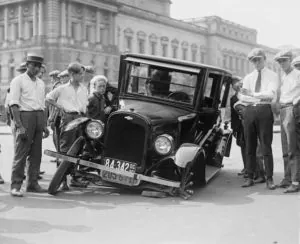Rideshare Accident Lawyers in Eaton, OH
Rideshares like Uber have become a popular transportation method over the past decade due to its convenience, price, and accessibility. Many companies have come out with a ridesharing model to decrease prices for riders and increase availability. The two biggest rideshare companies in the US are Uber and Lyft. Contact our Uber accident lawyers if you have been injured in a rideshare accident.
While rideshares have allowed average commuters to limit their own car usage, rideshares have actually increased traffic congestion in certain urban areas. This is due to the large percentage of time that drivers are looking for riders. Being on the road more and having a higher level of traffic congestion can lead to a higher chance of a car accident.
Rideshare drivers must pass a vehicle inspection and background check before they are able to start driving for the company. The vehicle must be in good shape and meet its company’s eligibility requirements. To make riding with their companies safer, background checks from Uber and Lyft pay special attention to previous traffic and drunk driving violations.
For a free legal consultation, call 937-733-6079
Understanding Who is Liable for Rideshare Accidents
Rideshare drivers, at Uber and Lyft, must have personal insurance that meets state minimums. As most insurance policies do not cover rideshare accidents, drivers are also required to add a rideshare policy from participating insurance companies. According to their websites, Uber and Lyft have similar insurance agreements with their drivers:
If the app is off: the driver’s personal insurance applies. The rideshare company is not liable.
If the app is on and the driver is available or waiting for a ride request, Lyft and Uber will provide third-party liability coverage for covered accidents if the driver’s personal insurance does not apply:
- $50,000 for bodily injury per person
- $100,000 for bodily injury per accident
- $25,000 for property damage per accident
If an accident happens when the driver is on their way to pick up passengers or while passengers are in the car, Uber and Lyft provide the following insurance for covered accidents:
- $1,000,000 for 3rd-party liability
- Uninsured/underinsured motorist bodily injury
- Contingent comprehensive and collision up to the actual cash value of the car with a $2,500 deductible
Third-party liability insurance applies to bodily injury or property damage to the claims of another.
As drivers must have insurance that has a rideshare policy, both the driver and the rideshare company can be held liable for an automobile accident, depending on the situation. However, the rideshare third-party liability insurance is set to help the parties that were not at fault. As rideshare drivers are independent contractors, and not employees, if the driver is at fault for the collision, the personal driver’s insurance is likely to be liable for the accident.
Eaton Rideshare Accident Lawyer Near Me 937-733-6079
Uber Fatal Car Accident Statistics
According to Uber’s most recently released US Safety Report, for an accident to be classified as an “Uber-related” fatal crash, one of the drivers of the collision must have been a certified Uber driver using the platform, and at least one person died within 30 days due to complications resulting from the collision. The classification does not determine fault or other factors that may have contributed to the collision, like a drunk driver, driving during peak hours, or the weather.
As of the most recent data available, Uber has reported an increase in fatal motor vehicle incidents associated with its platform. According to Uber’s U.S. Safety Report covering 2021–2022, there were 153 individual motor vehicle fatalities across 127 fatal Uber-related crashes. This represents a 40% increase in fatalities compared to the previous reporting period.
Key findings from the report include:
-
97% of Uber-related fatalities occurred in urban areas.
-
56% of fatalities involved risky driving behaviors such as speeding, alcohol impairment, or wrong-way driving.
-
One-third of Uber-related fatalities were linked to alcohol-impaired third-party drivers.
Despite these incidents, Uber reports that 99.9% of trips end without any safety-related issues. The company continues to invest in safety measures, including technology enhancements and driver education, to improve safety outcomes.
Click to contact our rideshare accident lawyers today
What Should You Do if You are Involved in an Uber or Lyft Accident?
While it is unlikely, accidents do happen. If you are injured in a rideshare collision, whether as a passenger, pedestrian, cyclist, or a third-party driver, what steps should you take? First, make sure you are physically and mentally okay. Seek medical treatment if necessary. Next, call the police. A police report can be useful to you when filing an insurance claim. While each rideshare company has its own support system for accidents, we recommend that you call any Uber accident lawyers or a Lyft accident attorneys like us before calling the rideshare company. The rideshare company has more interest in protecting themselves. Contact Kruger & Hodges‘ uber accident lawyers to help protect your rights.
On the Lyft app, you can report an accident under the Help tab, which will take you to a support page where you can either call or email Lyft to report the accident.
On the Uber app, you can contact Uber about an accident through the Trip and Fare Review tab.
Related Links:
FAQ: What is a Rear-End collision?
FAQ: Can my attorney access traffic camera footage of my accident?
FAQ: If I’m injured in a car accident with an uninsured motorist, can I be compensated?
Call or text 937-733-6079 or complete a Free Case Evaluation form




